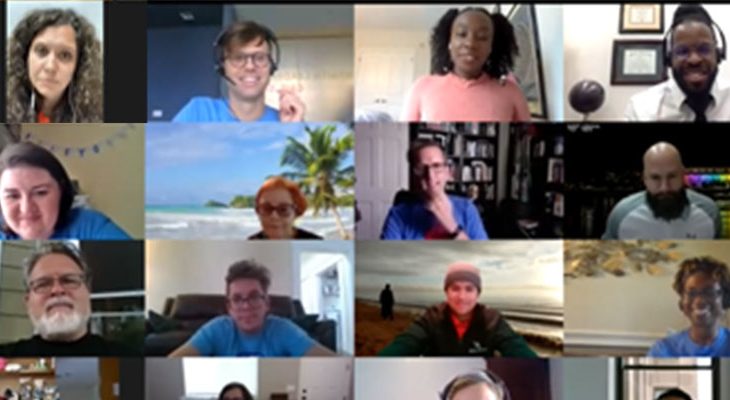The Future of Interfaith Leadership
September 30, 2020

Rarely can sitting on your butt all day contribute to a greater good. But when I clicked to exit the final Zoom session of the first-ever virtual Interfaith Leadership Institute, I felt like something remarkable had just happened. Nearly 800 students, faculty, university staff, alumni, and IFYC colleagues had created an online space that met the moment we are living in. In a year that has forced us to reflect, participants brought not just a willingness to learn but a fierce desire to act. 2020 has been a lot of things. Every day can feel exhausting right now. Leaving the ILI though, I felt more energized than I had in months. Here are some thoughts I took away from the day:
The Future of Interfaith Cooperation Lies in Addressing the Real Problems of Today. I led a training session with students at the ILI and joked that I could tell their personality just by how their room looked. In this Zoomed-in world, the divisions between your school, work, and personal lives are more like perforated lines in a notebook than solid borders. That certainly has downsides, but there are also some constructive things to take out of it. At the ILI, I saw students, educators, and our panelists making it clear that personal and societal are intimately connected now in a way that no one can deny. One of our panelists in our closing session, Olivia Elder, who works on criminal justice reform for FWD.us, spoke about the shame she felt in the past about her family’s past entanglements with the criminal justice system. She wouldn’t want to mention it to others, even close friends. But, over time as she became more open about them, those experiences are now what fuels her policy work with families impacted by incarceration. As Olivia put it, the values of “justice, redemption, and family” serve to connect all of us, across religious and philosophical differences, in forthrightly facing issues of race and inequality today.
Interfaith Leaders Will Shape the Change – A turning point. A reckoning. A left turn. A right turn. Whatever description or metaphor you want to use, all Americans recognize that 2020 is a year like no other and that what comes next has a chance to change American life. I shared in my training session with students that pluralism is the positive engagement of diversity. Students started sharing about how, in the past, discussing diversity seemed like entering a battle on their campus or community. Nothing seemed to come of it but exhaustion and ill-will. But they also shared that this year seemed different.
Share
Related Articles
This moment offers a chance to go beyond bromides; the young leaders in my training space wanted to fundamentally create a new culture on campus and their community. They were looking towards interfaith skills to do just that.
This moment offers a chance to go beyond bromides; the young leaders in my training space wanted to fundamentally create a new culture on campus and their community. They were looking towards interfaith skills to do just that.
Being Apart Gives Us New Ways to Come Together – I can’t lie: it was difficult not being able to see friends, colleagues, and supporters in-person. But there are some silver linings. Being virtual forced us to be creative and accessible. Since we couldn’t readily “copy and paste” an in-person event to an online forum, we had to think deeply about what made the ILI special and how do we re-create that between blinking Zoom boxes? I encourage every one of you to also think creatively about events or actions you’re doing: how can you recreate the spirit, if not the literal activity, of your work? Being online allowed us to attract more participants than ever before. This could be a chance to expand your work, not contract it. When people can access interfaith opportunities from their own dorm/apartment/phone/anywhere-with-good-Wi-Fi you get the chance to reach a lot more folks.
From a practical point of view, there are still lots of immediate ways for you to get involved. We have a number of webinars this fall addressing issues of interfaith leadership and engagement. As well, our online communities for specific types of universities are perfect opportunities to meet peers and discuss interfaith work in a campus context. Our new virtual We Are Each Other’s curriculum also offers a chance to start learning about interfaith leadership by completing a set of activities and assignments, all completely online.
The ILI gave me the chance to see that the reimaging of what interfaith work can do has begun. So, however you can engage, I say: let’s get started.



